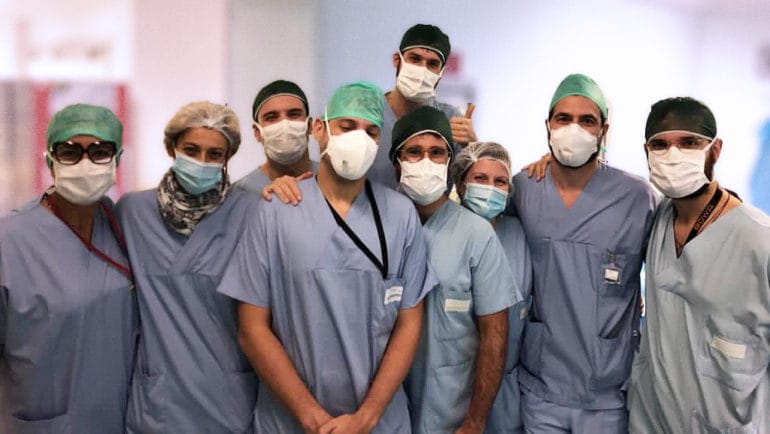New Study explores clinical benefits of electron-beam IORT in the treatment of borderline resectable pancreatic cancer
IntraOp Medical Corporation and the University of Verona in Italy announced today the enrollment of the first patient in the PancFORT Trial: A phase II study of primary chemotherapy, stereotactic body radiation therapy, and intraoperative radiation therapy in borderline resectable pancreatic adenocarcinoma.
Globally, over 460,000 patients are diagnosed with pancreatic cancer every year. Approximately 30% of those patients are diagnosed as having borderline resectable disease with an expected five-year survival rate of less than 15%.
The Pancreas Institute of the University of Verona is a world-renowned center of excellence for the treatment of pancreatic cancer with a dedicated multidisciplinary team that includes Gastroenterologists, Radiologists, Pathologists, and Oncologists. The General and Pancreatic Surgery Unit is led by Professor Claudio Bassi, MD, FRCS, FACS, FEBS, FASA (Hon.) and comprises a team of surgeons highly experienced in the treatment of all the inflammatory and neoplastic diseases of the pancreas, with a yearly operative caseload exceeding 400 pancreatic resections.
The PancFORT Trial is a prospective clinical trial led by principle investigators Salvatore Paiella, MD, PhD and Giuseppe Malleo, MD, PhD, that will explore the clinical benefits of delivering IORT in patients who’ve been diagnosed with borderline resectable pancreatic cancer and have undergone “total neoadjuvant” treatment including FOLFIRNOX and SBRT with a primary endpoint of three-year disease-specific survival. With the addition of electron beam IORT, the researchers anticipate the escalated dose will potentially improve survival with reduced likelihood of local recurrences and minimal side effects to the patients.
The overall radiotherapy dose administered in this study corresponds to an ablative biologically effective dose, which could significantly increase the tumor local control rate and finally improve patients’ survival. Moreover, for patients whose tumors are determined to be not operable at the time of surgery, delivering IORT as in situ treatment could prevent possible disorders related to tumor progression, such as pain, duodenal/stomach infiltration and bleeding, thus improving patient’s quality of life.”
“Despite recent improvements in oncologic treatments, the prognosis for patients diagnosed with borderline resectable pancreatic cancer remains quite poor.” stated Professor Claudio Bassi, MD, Chairman of the Surgery Unit of the Pancreas Institute of the University of Verona in Italy. “However, based on early results from PREOPANC trial, we see a promising opportunity to further improve clinical outcomes by combining a total neoadjuvant approach with an ablative dose of electron IORT delivered after resection or as an in situ treatment.”
“The overall radiotherapy dose administered in this study corresponds to an ablative biologically effective dose, which could significantly increase the tumor local control rate and finally improve patients’ survival.” stated Renzo Mazzarotto, MD, PhD, Chairman of the Radiation Oncology Department at the University Hospital of Verona, “Moreover, for patients whose tumors are determined to be not operable at the time of surgery, delivering IORT as in situ treatment could prevent possible disorders related to tumor progression, such as pain, duodenal/stomach infiltration and bleeding, thus improving patient’s quality of life.”

“We are honored to be joining forces with Professor Bassi, Dr Mazzarotto, Drs Paiella and Malleo, and the rest of the team at the University Hospital of Verona to bring new treatment options to patients suffering from pancreatic cancer,” said Derek T. DeScioli, Chief Executive Officer of IntraOp Medical Corporation. “As one of the most experienced and innovative pancreatic centers in Europe, they are a perfect partner for advancing the science and clinical evidence supporting the role of IORT in treating this dreadful disease. We look forward to the ongoing collaboration.”